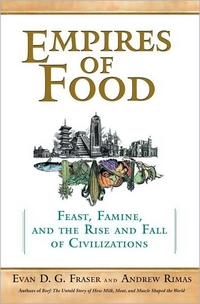

Purchase
Feast, Famine, and the Rise and Fall of Civilizations
Simon and Schuster
June 2010
On Sale: June 1, 2010
322 pages
ISBN: 1439101892
EAN: 9781439101896
Hardcover
Add to Wish List
Non-Fiction History
We are what we eat: this aphorism contains a profound truth
about civilization, one that has played out on the world
historical stage over many millennia of human endeavor. Using the colorful diaries of a sixteenth-century merchant
as a narrative guide, Empires of Food vividly chronicles the
fate of people and societies for the past twelve thousand
years through the foods they grew, hunted, traded, and ate
and gives us fascinating, and devastating, insights into
what to expect in years to come. In energetic prose, agricultural expert Evan D. G. Fraser
and journalist Andrew Rimas tell gripping stories that
capture the flavor of places as disparate as ancient
Mesopotamia and imperial Britain, taking us from the first
city in the once-thriving Fertile Crescent to today's
overworked breadbaskets and rice bowls in the United States
and China, showing just what food has meant to humanity. Cities, culture, art, government, and religion are founded
on the creation and exchange of food surpluses, complex
societies built by shipping corn and wheat and rice up
rivers and into the stewpots of history's generations. But
eventually, inevitably, the crops fail, the fields erode, or
the temperature drops, and the center of power shifts. Cultures descend into dark ages of poverty, famine, and war.
It happened at the end of the Roman Empire, when slave
plantations overworked Europe's and Egypt's soil and drained
its vigor. It happened to the Mayans, who abandoned their
great cities during centuries of drought. It happened in the
fourteenth century, when medieval societies crashed in
famine and plague, and again in the nineteenth century, when
catastrophic colonial schemes plunged half the world into a
poverty from which it has never recovered. And today, even
though we live in an age of astounding agricultural
productivity and genetically modified crops, our food
supplies are once again in peril. Empires of Food brilliantly recounts the history of cyclic
consumption, but it is also the story of the future; of, for
example, how a shrimp boat hauling up an empty net in the
Mekong Delta could spark a riot in the Caribbean. It tells
what happens when a culture or nation runs out of food and
shows us the face of the world turned hungry. The authors
argue that neither local food movements nor free market
economists will stave off the next crash, and they propose
their own solutions. A fascinating, fresh history told through the prism of the
dining table, Empires of Food offers a grand scope and a
provocative analysis of the world today, indispensable in
this time of global warming and food crises.
Comments
No comments posted.
Registered users may leave comments.
Log in or register now!
| 


 © 2003-2024 off-the-edge.net
all rights reserved Privacy Policy
© 2003-2024 off-the-edge.net
all rights reserved Privacy Policy